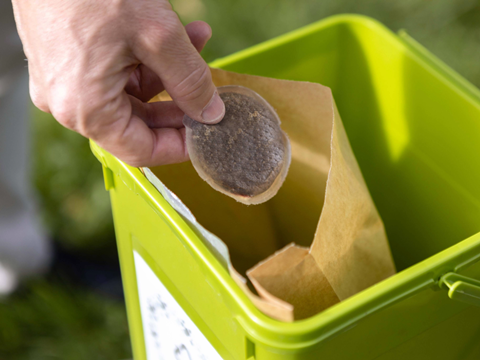
Ahlstrom has launched GreenPod Home, its TÜV-certified home-compostable coffee pod portfolio. It is designed to break down in domestic conditions without contaminating the environment.
After receiving TÜV Austria’s official OK compost HOME certification, the lineup is said to biodegrade without leaving microplastics or toxic residues behind.
Apparently, the range will be compatible with all common converting lines and unlock ‘optimal’ brewing performance – all while allowing brand owners and converters to distribute coffee pod solutions that consumers can compost at home.
Ahlstrom offers soft pods in 19.0 g/m2, 21.0 g/m2, and 21.5 g/m2 varieties, alongside hard pods in a 25.0 g/m2 format. The grades can reportedly be tailored in basis weight in line with customer requirements.
“Demand for sustainable alternatives drives innovation in coffee markets,” says Patrice Blanc, head of R&D at Ahlstrom. “Although Ahlstrom was already able to offer industrially compostable solutions to the market, this home compostable patent-pending solution is a major step forward that reinforces Ahlstrom’s strong credentials in biodegradable fibre-based solutions for coffee applications.”
Philippe Sevoz, vice president, Beverage and Casing, adds: “Aligned with Ahlstrom’s sustainability priorities and incoming stronger regulations within the food packaging industry, we are committed to becoming the market reference in sustainability and to offer our customers a complete portfolio of heat-sealable and non-heat-sealable home compostable tea and coffee solutions.”
In similar news, OxBarrier revealed last month that it was launching an international technology licensing programme for its patented compostable single-serve capsule technology. Customers are expected to make progress in their internal sustainability commitments and avoid the environmental impacts of conventional single-use coffee capsules, all while maintaining product performance.
Nespresso Canada and Éco Entreprises Québec have also announced the expansion of their ‘green bag’ coffee capsule recycling programme across all municipalities in Quebec. It invites consumers to place their used Nespresso coffee capsules in free bags provided with online orders from Nespresso; filled bags can then be placed in a residential recycling bin, which is hoped to simplify the recycling process for empty capsules.
Additionally, Ahlstrom will join Packaging Europe for a series of webinars this month – one on the topic of paper-based confectionery packaging, and another covering a transition into dry forming technology.
If you liked this story, you might also enjoy:
The ultimate guide to the Packaging and Packaging Waste Regulation in 2025
How are the top brands progressing on packaging sustainability?
Everything you need to know about global packaging sustainability regulation in 2025
The key to increasing the use of reusable packaging in supermarkets














No comments yet